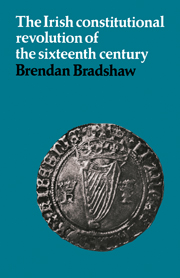Book contents
- Frontmatter
- Contents
- Dedication
- Preface
- Abbreviations
- Ireland about 1530
- PART I ‘A discourse of the cause of the evil state of Ireland and of the remedies thereof’
- PART II The reform of the Lordship in the era of Thomas Cromwell, 1530–40
- 4 The revival of crown government
- 5 The Irish Lordship and the Cromwellian state
- 6 Reform and reaction
- PART III The liberal revolution
- Bibliography
- Index
5 - The Irish Lordship and the Cromwellian state
Published online by Cambridge University Press: 07 October 2011
- Frontmatter
- Contents
- Dedication
- Preface
- Abbreviations
- Ireland about 1530
- PART I ‘A discourse of the cause of the evil state of Ireland and of the remedies thereof’
- PART II The reform of the Lordship in the era of Thomas Cromwell, 1530–40
- 4 The revival of crown government
- 5 The Irish Lordship and the Cromwellian state
- 6 Reform and reaction
- PART III The liberal revolution
- Bibliography
- Index
Summary
The tenet of unitary sovereignty postulated the king as the source of all authority within his dominions. Jurisdiction emanating from alternative centres was regarded as a usurpation of royal jurisdiction. This precluded acceptance, on the one hand, of an autonomous external source of spiritual jurisdiction, the papacy, and, on the other hand, of autonomous internal sources of temporal jurisdiction such as feudal liberties and other semiindependent franchises held by the great magnates. We have seen how the Cromwellian reform programme provided for the elimination of local autonomy within the area of the crown's sovereign jurisdiction in Ireland. In this chapter we shall consider the reform programme in relation to the Church. That discussion, however, must be preceded by consideration of yet another sphere in which unitary sovereignty caused the existing (medieval) situation to be superseded: the constitutional status of the Irish Lordship itself.
The principle of unitary sovereignty demanded a system of political organisation with one only source of sovereign jurisdiction. Thus, just as it decreed the assimilation of the semiautonomous local lordships within the framework of the crown's sovereign jurisdiction, so also it decreed the assimilation of the ‘all but’ autonomous Irish Lordship within the jurisdictional framework of the English kingdom. The historian is much assisted in examining the former process by the modification and redefinition of the magnates' political function that is authoritatively set out in the Ordinances for Ireland and in the indenture subscribed by the Butler earl in 1534. No similar source exists on which to base an examination of the transformation effected in the political institutions of the Lordship. Nevertheless, the process can be observed well enough in the practice of government.
- Type
- Chapter
- Information
- The Irish Constitutional Revolution of the Sixteenth Century , pp. 139 - 163Publisher: Cambridge University PressPrint publication year: 1979



